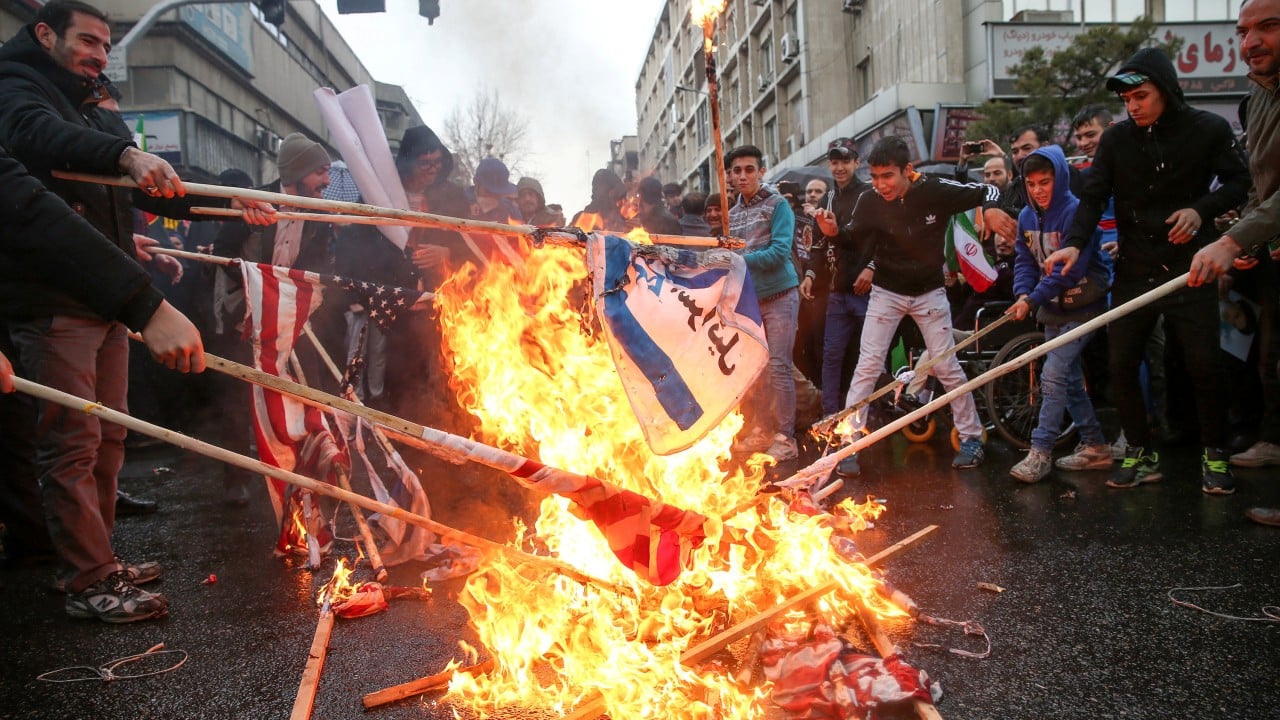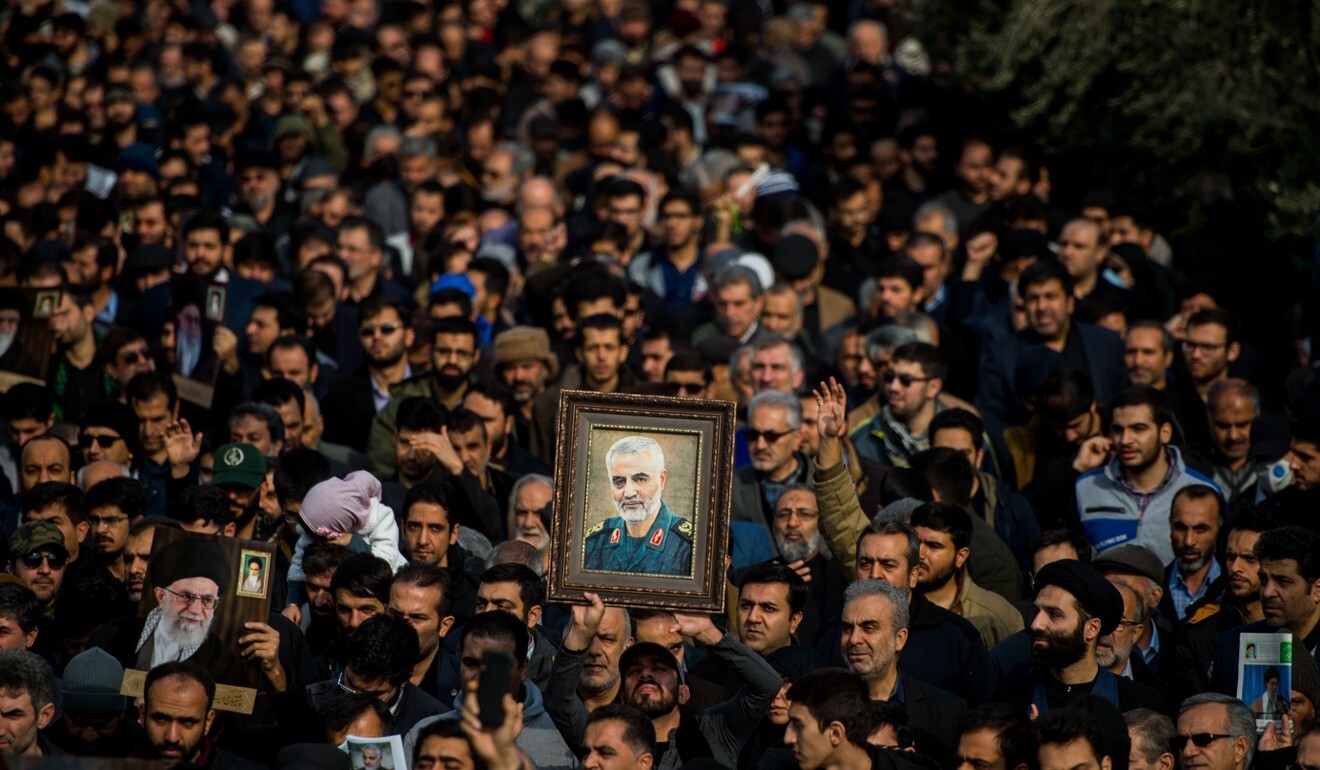
US triggers ‘snapback’ process to declare Iran UN sanctions back in force, but world yawns
- United States promises to punish those who violate the sanctions, in move that risks increasing Washington’s isolation
- All other great powers - China, Russia and also America’s own European allies - have challenged claim
The Trump administration declared that all UN sanctions against Iran have been restored, a move most of the rest of the world rejects as illegal and sets the stage for an ugly showdown at the world body ahead of its annual General Assembly.
The administration said that its triggering of the “snapback” mechanism in the UN Security Council resolution that enshrined the 2015 Iran nuclear deal had taken effect at 8pm Eastern time Saturday (8am Hong Kong time Sunday). That is 30 days after Secretary of State Mike Pompeo notified the council that Iran was in “significant non-performance” with its obligations under the accord, known as the Joint Comprehensive Plan of Action, or JCPOA.
“The United States took this decisive action because, in addition to Iran’s failure to perform its JCPOA commitments, the Security Council failed to extend the UN arms embargo on Iran, which had been in place for 13 years,” Pompeo said in a statement released at precisely 8pm.
Iran still expanding its stockpile of enriched uranium, IAEA finds
“In accordance with our rights … we initiated the snapback process to restore virtually all previously terminated UN sanctions, including the arms embargo,” he said. “The world will be safer as a result.”
The White House plans to issue an executive order on Monday spelling out how the US will enforce the restored sanctions, and the State and Treasury departments are expected to outline how foreign individuals and businesses will be penalised for violations.
“The United States expects all UN, member states to fully comply with their obligations to implement these measures,” Pompeo said. “If UN, member states fail to fulfil their obligations to implement these sanctions, the United States is prepared to use our domestic authorities to impose consequences for those failures and ensure that Iran does not reap the benefits of UN-prohibited activity.”

06:04
Why can't Iran and the US get along?
But the US move faces stiff opposition from the other members of the Security Council who have vowed to ignore it. They say the US lost legal standing to invoke snapback when President Donald Trump withdrew from the nuclear deal in 2018 and reimposed American sanctions on Iran.
United Nations Secretary-General Antonio Guterres told the Security Council on Saturday he could nog take any action on the US declaration because “there would appear to be uncertainty” on the issue
UN officials provide administrative and technical support to the Security Council to implement its sanctions regimes and Guterres appoints independent experts to monitor implementation. He said that “pending clarification” of the status of the Iran sanctions, he would not take any action to provide that support.
The US argues it retains the right to do it as an original participant in the deal and a member of the council.
Even before the US declaration, fellow Security Council members said the declaration had no legal force, calling into question the ability to enforce snapback. Snapback means that international sanctions eased or lifted by the nuclear deal are reimposed and must be enforced by UN member states, including hitting Iran with penalties for uranium enrichment to any level, ballistic missile activity and buying or selling conventional weapons.
Russia, China and Iran trying to hack US presidential race, Microsoft says
Those bans were either removed or set to expire under the terms of the deal in which Iran was granted billions of dollars in sanctions relief in return for curbs on its nuclear programme.
China and Russia have been particularly adamant in rejecting the US position, but US allies have not been shy either. In a letter sent Friday to the president of the Security Council, Britain, France and Germany – the three European participants who remain committed to the deal – said the US announcement “is incapable of having legal effect and so cannot bring in to effect the procedure”.
“It flows from this that any decisions and actions which would be taken based on this procedure or on its possible outcome would also be incapable of having any legal effect,” they wrote. Thus, the three countries said, the sanctions relief provided by the nuclear deal will remain in place.
In its own letter to the Security Council on Saturday, Iran said the US move “is null and void, has no legal standing and effect and is thus completely unacceptable”.

US officials have talked tough about their intentions to ensure the sanctions are enforced, but it remains unclear how the administration will respond to being ignored, particularly by its European allies, which have pledged to keep the nuclear deal alive. A wholesale rejection of the US position could push the administration, which has already withdrawn from multiple UN agencies, organisations and treaties, further away from the international community.
In the midst of a heated campaign for re-election, Trump plans to address Iran in a speech to the General Assembly’s annual high-level meeting on Tuesday. Officials say he will also touch on his brokering of agreements for Israel and the United Arab Emirates and Bahrain to normalise relations in part to solidify a regional bulwark against Iran.
And, as he seeks to demonstrate statesmanlike credentials ahead of the election, Trump has injected another element of uncertainty into the mix by threatening to retaliate “1,000 times” harder against Iran if it attacks US personnel overseas.
Iran weighs ‘plot to kill US ambassador to South Africa’ to avenge general’s death
Iran earlier Saturday warned that it may still strike US interests to avenge the death of a top Iranian general in an American air strike earlier this year. But the head of the country’s Revolutionary Guard Corps mocked a report that it was plotting to assassinate the US ambassador to South Africa, saying Iran’s response would target people directly or indirectly involved in the general’s death.
Amid uncertainty over that, the other 14 members of the Security Council and all but about five of the UN‘s 195 member states say the US lost its legal standing to act on sanctions when Trump withdrew from the nuclear accord more than two years ago.
Pompeo travelled to the United Nations on August 20 to formally notify the Security Council that the US was triggering snapback because Iran is not complying with the nuclear deal. He dismissed suggestions that the administration was engaged in anything legally questionable or even controversial.
He has said the snapback mechanism was the “one thing that the previous administration got right” in the nuclear deal that Trump has denounced as the worst deal ever negotiated. Yet, aside from Israel and the Gulf Arab states, almost no country in the world agrees with the US
Trump administration officials have been attacking the 2015 nuclear deal for years. They say it is fatally flawed because certain restrictions on Iran’s nuclear activity gradually expire and will allow the country to eventually develop atomic weapons.
The immediate concern of the US has been the indefinite extension of the arms embargo that would otherwise expire on October 18. The Security Council rejected a US effort to extend the embargo in a lopsided vote which saw the United States get support from only one country, the Dominican Republic.
Additional reporting by Agence France-Presse and Reuters

